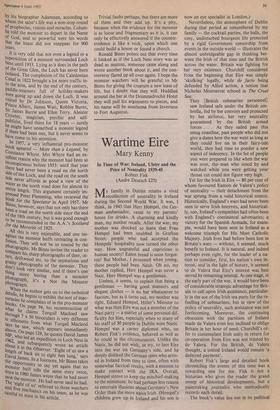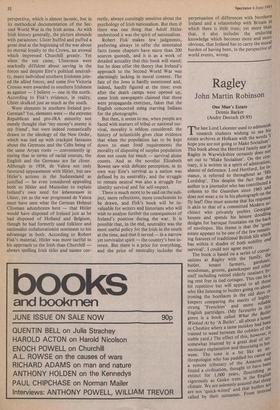Wartime Eire
Mary Kenny
In Time of War: Ireland, Ulster and the Price of Neutrality 1939-45 Robert Fisk (Andre Deutsch £25)
My family in Dublin retains a vivid recollection of neutrality in Ireland during the Second World War. It was, I think, in 1943 that Herr Hempel, the Ger- man ambassador, came to my parents' house for drinks. A charming and kindly man, my mother recalls. After the war, my mother was shocked to learn that Frau Hempel had been snubbed in Grafton Street: people who had accepted the Hempels' hospitality now turned the other way. How ungrateful and capricious is human society! Eaten bread is soon forgot- ten! But Mother, I protested when young, these people had been Nazis. Oh no, my mother replied, Herr Hempel was never a Nazi. Herr Hempel was a gentleman.
Useless, it seems, to explain that being a gentleman — having good manners and elegant clothes — is no bar whatsoever to fascism, but as it turns out, my mother was right. Eduard Hempel, Hitler's Minister to what was then Eire was not a member of the Nazi party — a matter of some personal dif- ficulty for him, especially when so many of his staff of 30 people in Dublin were Nazis. Hempel was a career diplomat who, on Robert Fisk's evidence, behaved as well as he could in the circumstances. Unlike the Nazis, he did not wish, or try, to lure Eire into the war on Germany's side, and he deeply disliked the German spies who arriv- ed in Ireland from time to time, often with somewhat farcical results, with a mission to make contact with the IRA. Overall, Hempel strove to keep the mischief-making to the minimum: he had perhaps less reason to entertain illusions about Germany's New Order than the more naive Irish. (Hempel's children grew up in Ireland and his son is
now an eye specialist in London.)
Nevertheless, the atmosphere of Dublin during that period as remembered by my family — the cocktail parties, the balls, the cosy, undisturbed bourgeois life protected by a rigid Government censorship from events in the outside world — illustrates the almost unbridgeable gap in thinking bet- ween the Irish of that time and the British across the water. Britain was fighting for her very existence. Churchill considered from the beginning that Eire was simply `skulking' legally, while de facto being defended by Allied action, a notion that Nicholas Montserrat echoed in The Cruel Sea.
They [British submarine personnel] saw Ireland safe under the British um- brella, fed by her convoys and protected by her airforce, her very neutrality guaranteed by the British armed forces . . . As they sailed past this
smug coastline, past people who did not
give a damn how the war went as long as they could live on in their fairy-tale world, they had time to ponder a new aspect of indecency. In the list of people you were prepared to like when the war was over, the-man who stood by and watched while you were getting your throat cut could not figure very high.
Yet for the Irish in Eire — 80 per cent of whom favoured Eamon de Valera's policy of neutrality — their detachment from the war sprung from a valid historical source. Historically, England's wars had never been seen to serve Irish interests, and historical- ly, too, Ireland's sympathies had often been with England's continental adversaries; a victory for the Spanish Armada, for exam- ple, would have been seen in Ireland as a welcome triumph for His Most Catholic Majesty. Irish lives had before been lost in Britain's wars — without, it seemed, much benefit to Ireland. It is natural, and indeed perhaps even right, for the leader of a na- tion to consider, first, his nation's own in- terest, and in the light of history, it seemed to de Valera that Eire's interest was best served by remaining neutral. At one stage, in the early part of the war, it would have been of considerable strategic advantage for Brit- ain to call upon Irish assistance, particular- ly in the use of the Irish sea ports for the re- fuelling of submarines, but in view of the policy of neutrality, such assistance was not forthcoming. Moreover, the continuing obsession with the partition of Ireland made de Valera even less inclined to oblige Britain in her hour of need.. Churchill's of- fer to contemplate Irish unity in return for co-operation from Eire was not trusted by de Valera. For the British, de Valera thought, a united Ireland would remain 'a deferred payment'.
Robert Fisk's large and detailed book chronicling the events of this time was a rewarding one for me. Fisk is not a historian who gives the reader the grand sweep of historical developments, but a painstaking journalist who methodically records each detail.
The book's value lies not in its political perspective, which is almost laconic, but in its methodical documentation of the Sec- ond World War in the Irish arena. As with Irish history generally, the picture abounds with paradoxes: Ulster huffed and puffed a great deal at the beginning of the war about its eternal loyalty to the Crown, an avowal which impressed Churchill greatly. Yet when the test came, Ulstermen were markedly diffident about serving in the forces and despite Eire's political neutrali- ty, many individual southern Irishmen join- ed the allied forces, and some five Victoria Crosses were awarded to southern Irishmen as against — I believe — one in the north. According to Fisk's evidence, in reality, Ulster skulked just as much as the south.
Were elements in southern Ireland pro- German? Yes, elements were — the extreme Republican and pro-IRA minority not merely thought that 'my enemy's enemy is my friend', but were indeed romantically drawn to the ideology of the New Order, which was tied up with crackpot fantasies about the Germans and the Celts being of the same Aryan roots — conveniently ig- noring that in terms of racial sources, the English and the Germans are far closer. Although in 1938, de Valera not only favoured appeasement with Hitler, but saw Hitler's actions in the Sudetenland as justified — he even considered appealing both to Hitler and Mussolini to explain Ireland's own need for lebensraum in Ulster, yet as the war progressed de Valera must have seen what the German Helmut Clissman adumbrates here — that Hitler would have disposed of Ireland just as he had disposed of Holland and Belgium, though he had formerly used folklore and nationalist collaborationist sentiment to his advantage in both. According to Robert Fisk's material, Hitler was more tactful in his approach to the Irish than Churchill — always spelling Irish titles and names cor-
rectly, always cunningly sensitive about the psychology of Irish nationalism. But then if there was one thing that Adolf Hitler understood it was the spirit of nationalism.
Robert Fisk makes few judgments, preferring always to offer the annotated facts (some chapters have more than 200 sources quoted), and it is as a work of detailed actuality that this book will stand; but he does offer the theory that Ireland's approach to the Second World War was alarmingly lacking in moral content. The fate of the Jews is hardly mentioned and, indeed, hardly figured at the time; even after the death camps were opened up, some Irish newspapers claimed that these were propaganda exercises, fakes that the English concocted using starving Indians for the photographs.
But then, it seems to me, when people are faced with matters of tribal or national sur- vival, morality is seldom considered: the history of infanticide gives clear evidence that when the population has to be kept down to meet food requirements the morality of disposing of surplus population does not count for much — survival alone counts. And as the novelist Elizabeth Bowen saw with delicate perception, in its own way Eire's survival as a nation was defined by its neutrality, and the struggle to remain neutral was also a struggle for identity survival and for self-respect.
There is much more to be said on the sub- ject, more reflections, more conclusions to be drawn, and Fisk's book will be in- valuable for writers and historians who will wish to analyse further the consequences of Ireland's position during the war. It is possible that, in the end, neutrality was the most useful policy for the Irish in the south at the time, and that it served — in a narrow yet survivalist spirit — the country's best in- terest. But there is a price for everything, and the price of neutrality includes the perpetuation of differences with Northern Ireland and a relationship with Britain in which there is little trust; yet more than that, it also includes the enduring knowledge which becomes more and more obvious, that Ireland has to carry the moral burden of having been, in the perspective of world events, wrong.















































 Previous page
Previous page